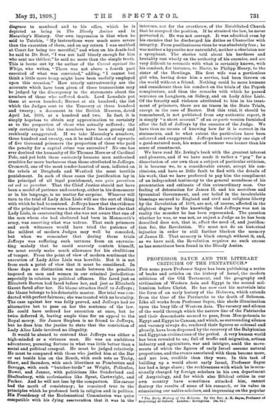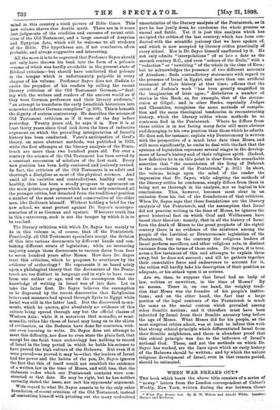PROFESSOR SAYCE AND THE LITERARY CRITICISM OF THE PENTATEUCH.*
FOB some years Professor Sayce has been publishing a series of books and articles on the history of Israel, the modern criticism of the Old Testament, and the geography and civilisation of Western Asia and Egypt in the second mil- lennium before Christ. He has now cast his materials into the form of an early history of the Hebrews, which extends from the time of the Patriarchs to the death of Solomon. Like all works from Professor Sayce, this sheds illumination upon the busy life of Western Asia. The vacancy and silence of the world through which the narrow line of the Patriarchs and their descendants seemed to pass, from Mesopotamia to Egypt and Egypt to Canaan, and which, as surrounding silence and vacancy always do, rendered their figures so colossal and ghostly, have been dispersed by the recovery of the Babylonian and Egyptian civilisations of the period. A. very human world has been revealed to us; full of traffic and migration, artisan industry and agriculture, war and intrigue, amid the move- ments of which the figures of early Israel assume natural proportions, and the events associated with them become more, and not less, credible than they were. In this task of building up a world about early Israel, Professor Sayoe has had a large share ; the recklessness with which he is occa- sionally charged by foreign scholars in his own department of Assyriology, and for which also Biblical critics in our own country have sometimes attacked him, cannot destroy the results of some of his research, or its value in stimulating our native scholars, and impressing on the popular • The Early History of the Harms. By the Be•. A. H. Beyoe,Profeemor of Assyriology at Oxford. London Rivingtons. Re. ed.]
mind in this country a vivid picture of Bible times. This new volume shares that double merit. There are in it some just judgments of the crudities and excesses of recent criti- cism of the Old Testament, and a large amount of Assyrian and Egyptian data, which will be welcome to all students of the Bible. The hypotheses are, if not conclusive, of ten probable, and always suggestive and interesting.
All the more it is to be regretted that Professor Sayce should -not only have thrown his book into the form of a polemic —some of which was hardly avoidable in the present state of Biblical criticism—but should have conducted that polemic in the temper which is unfortunately palpable in every chapter of his volume. Professor Sayce does not disdain to excite the prejudice of his readers by calling the recent literary criticism of the Old Testament German,—" deal- ing with the writers and readers of the ancient world as if they were German professors and their literary audience," " an attempt to transform the early Israelitish historians into somewhat inferior German compilers" (p. 108). This is beneath the dignity of serious controversy. He describes the science of Old Testament criticism as if it were of the day before yesterday. Twenty years old, he says it is. Now it is at least thirty years since Graf laid down the lines of inductive argument on which the prevailing interpretation of Israel's history has been conducted. Vatre's anticipation of Graf's theory, on more abstract methods, was published in 1833, while the first attempts at the literary analysis of the Penta- teuch are more than two hundred years old. For over a century the science of the Old Testament has been served by a constant succession of scholars of the first rank. Every new position has been hotly contested and jealously revised. in fact, the criticism of the Old Testament is as adult and thorough a discipline as most of the physical sciences. And amid all its varieties and contradictions, healthy and un- healthy, there has been a steady progress to agreement on the main points,—a progress which has not only convinced all the younger critics, but detached from the traditional position a number of the most reverent and conservative of the older men, like Delitzsch himself. Without holding a brief for the new school, we must protest against Dr. Sayce's misrepre- sentation of it as German and upstart. Wherever truth lies in this controversy, such is not the temper by which it is to be reached.
The literary criticism with which Dr. Sayce has mainly to do in this volume is, of course, that of the Pentateuch. Practically, all Old Testament specialists accept the division of this into various documents by different hands and con- taining different strata of legislation ; while an increasing majority assign these documents to various dates from four to seven hundred years after Moses. How does Dr. Sayce treat this criticism, which he proposes to overthrow by the evidence of archmology P He represents it as based solely upon a philological theory that the documents of the Penta- teuch are too distinct in language and in style to have come from one author or age, and on the assumption that the knowledge of writing in Israel was of late date. Let us take the latter first. Dr. Sayce believes the assumption to be disproved by the recent discoveries that Babylonian letters and manners had spread through Syria to Egypt while Israel was still in the latter land. But the discovered monu- ments, which he quotes, give absolutely no evidence of this culture being spread through any but the official classes of Western Asia ; while it is notorious that nomadic, or semi- nomadic, tribes like those of Israel may hang on to the skirts of civilisation, as the Bedouin have done for centuries, with- out even learning to write. Dr. Sayce does not attempt to meet this difficulty, nor does he even state the plain fact, that except for one faint trace archteology has nothing to record of Israel in the long period in which he holds his science to have proved the high culture of the Hebrews. But even if it were proved—as proved it may be—that the leaders of Israel had the power and the habits of the pen, Dr. Sayce ignores the fact that this of itself would not establish the existence of a written law in the time of Moses, and still less, that the elaborate codes which our Pentateuch contains were con- structed at that date. He may be right, but he has neither correctly stated the issue, nor met his opponents' argument. With regard to what Dr. Sayce asserts to be the only other foundation of recent criticism of the Old Testament, instead of contenting himself with pointing out the many undoubted , uncertainties of the literary analysis of the Pentateuch, as in part he has justly done, he condemns the whole process as
unreal and futile. Yet it is just this analysis which has occupied the critics of the last century, which has been con- ducted with the scientific jealousy that we have spoken of, and which is now accepted by literary critics practically of every school. Nor is Dr. Sayce himself unaffected by it. He not only admits "interpolations" of so late a date as the seventh century B.C., and even "echoes of the Exile," with a "redaction " or " rewriting " of the whole in the time of Ezra; but he acknowledges the presence of two different accounts of Abraham ; finds contradictory statements with regard to the presence of Israel in Egypt, and more than one artificial treatment of their history at that time; affirms that the extent of Joshua's work " has been greatly magnified in the imagination of later ages;" disbelieves a number of stories in this Book, as, for example, that of the circum- cision at Gilgal; and in other Books, especially Judges and Chronicles, recognises the same methods of compila- tion and the same theological tendencies in reconstructing history, which the literary critics whose methods he so contemns find in the Pentateuch. Where he differs from these critics is in not facing many facts still more obvious and damaging to his own position than those which he admits. He does not, for instance, explain why Deuteronomy is written with the perspective of a much later date than Moses, and still more significantly, he omits to deal with the fact that the systems of legislation represent several stages in the develop- ment of Israel's history and of their religious spirit. (Indeed, how defective he is on this point is clear from his remarkable assertion that " the monotheism of the Song of Deborah is the monotheism of the Pentateuch," p. 302.) In short, the volume brings upon the mind of the reader the impression that Dr. Sayce, while adopting the methods of the literary critics he condemns, simply differs from them in being not so thorough in his analysis, nor so logical in his conclusions. This, however, becomes most clear in an omission from his list of the foundations of that criticism. When Dr. Sayce says that these foundations are the literary analysis of the Pentateuch, and the assumption that Israel did not practise writing in the time of Moses, he ignores the great historical fact on which Graf and Wellhausen have based their theories : namely, that in all the history of Israe: from the death of Moses to the great prophets of the eighth century there is no evidence of the existence among the people of the Levitical or Deuteronomic legislation of the Pentateuch, but on the contrary the religious leaders of Israel perform sacrifices, and other religious acts, in distinct variance from the terms of those codes. Dr. Sayce, it is true, notes a few instances of this and attempts to explain them away, but he does not succeed ; and till he gathers together their cumulative force and endeavours to account for it, the critics will hardly take his description of their position as adequate, or his attack upon it as serious.
Are we, then, to suppose that Israel had no body of law, written or unwritten, in the time of Moses P By no means. There is, on one hand, the weighty tradi- tion that Moses was the founder of his people's institu- tions; and on the other hand, the fact that a large portion of the legal contents of the Pentateuch is much the same as the social custom which prevailed among other Semitic nations ; and it therefore must have been inherited by Israel from their Semitic ancestry long before the age of Moses. What Moses did for his people, as the most sceptical critics admit, was at least to infuse this with that strong ethical principle which differentiated Israel from their Semitic neighbours, and there is abundant proof that this ethical principle was due to the influence of Israel's national God. These, and not the methods on which Dr. Sayce has worked, are the lines upon which an early history of the Hebrews should be written; and by which the unique religious development of Israel, even in that remote period, should be estimated.



































 Previous page
Previous page